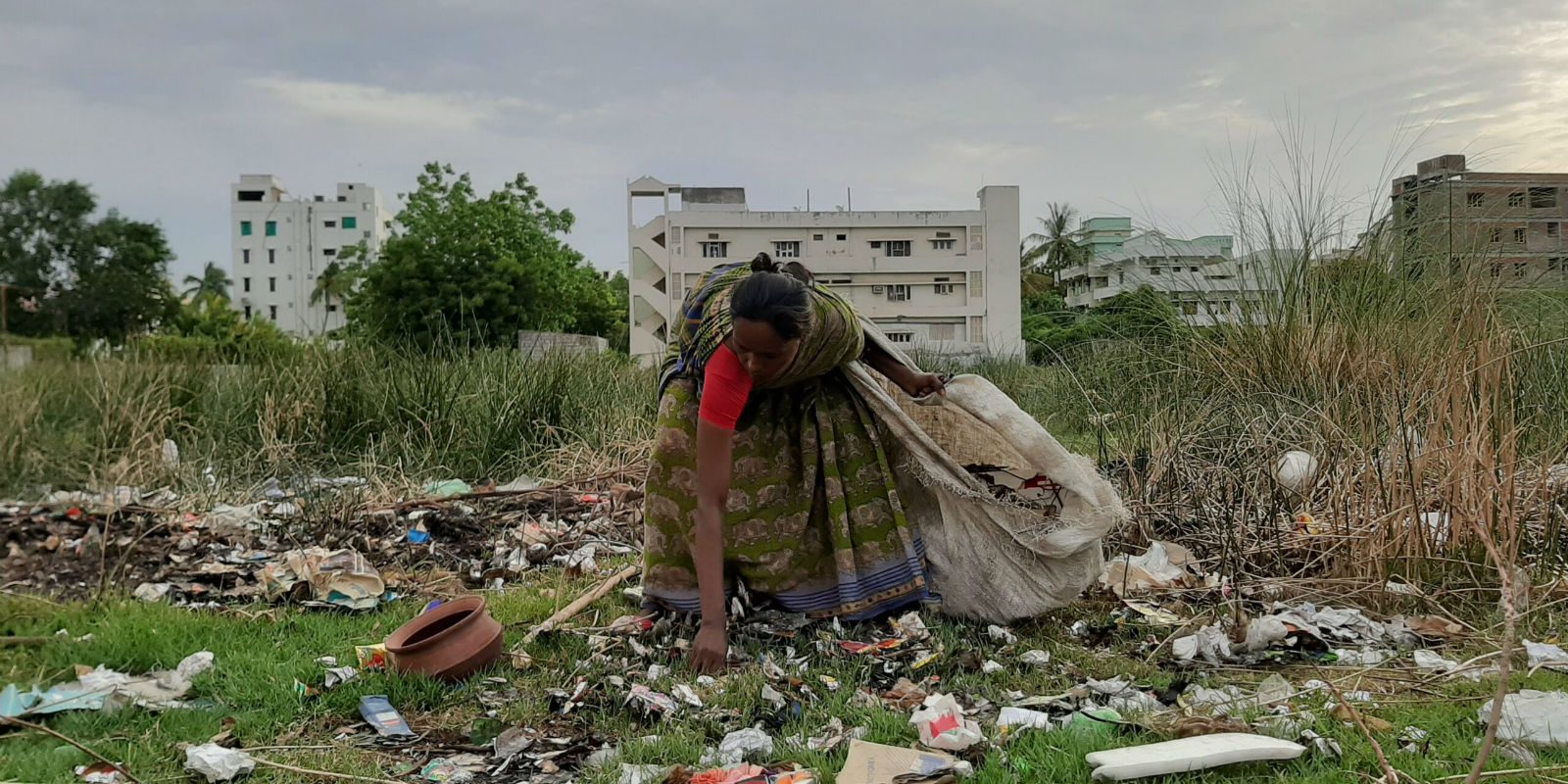
Shadowing Suvartha on her waste-picking route in Vijayawada
Located on the banks of the Krishna river in the Indian state of Andhra Pradesh, Vijayawada is home to 10.3 lakh people.
The city is the second largest city in the state by population and the third most densely populated urban built-up area in the world, with around 31,200 people per square km.
The name Vijayawada translates to the “Land of Victory” – a Hindu mythological reference to good triumphing over evil.
As with most cities, Vijayawada has a waste disposal problem. Waste pickers working in the informal sector in Vijayawada are scattered across the city and live in slums, some even live on the fringes of these slums.
 Having never ‘shadowed’ anyone before I had questions and fears. The most prominent of these was as to how the waste pickers would feel about me shadowing them and how afraid I was of unintentionally rubbing them the wrong way – by saying or doing something that would make me come across as ignorant, pretentious or shallow.
Having never ‘shadowed’ anyone before I had questions and fears. The most prominent of these was as to how the waste pickers would feel about me shadowing them and how afraid I was of unintentionally rubbing them the wrong way – by saying or doing something that would make me come across as ignorant, pretentious or shallow.
I was also nervous about the security concerns associated with walking around in an unknown city at early in the morning. I tried my best to not be prejudiced by irrational fears and fortunately they were put to rest by my companions.
Despite my fears, I was eager to break out of my comfort zone.
 At 02.30 in the morning I sat in the car, on my way to meet the waste pickers. A range of emotions swept over me – anxiety, curiosity, excitement and nervousness. The ride was a quiet one, the roads were empty without a soul in sight. As we approached a residential colony, we could see some ghostly figures in the distance, lugging heavy sacks on their heads.
At 02.30 in the morning I sat in the car, on my way to meet the waste pickers. A range of emotions swept over me – anxiety, curiosity, excitement and nervousness. The ride was a quiet one, the roads were empty without a soul in sight. As we approached a residential colony, we could see some ghostly figures in the distance, lugging heavy sacks on their heads.
I could see some makeshift homes at the periphery of the residential colony. They were located right below the Vijayawada – Guntur highway and alongside the riverbank. The light was low. The route leading up to where the waste pickers live was littered with trash. Most people were sleeping on the ground, outside of their tents, including small children and the elderly. Pigs, cows, dogs and hundreds of flies circled the waste pickers at rest.
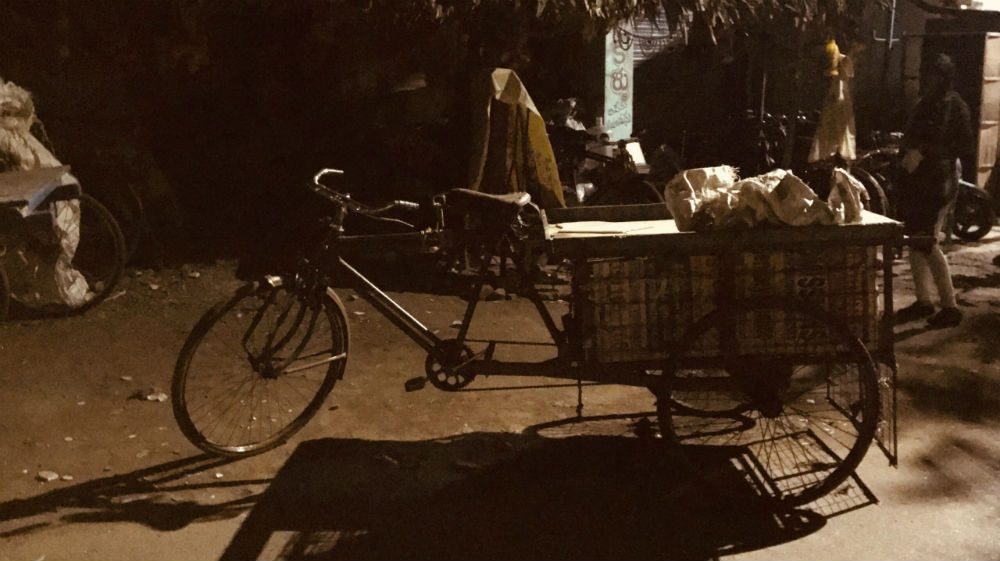
I was introduced to ‘Suvartha’ the woman who I would be shadowing. She told me that all the waste pickers there have a custom of starting their day by having tea together and then heading out for work.
 Suvartha first went to a ‘kabadi’ shop (junk/scrap dealer) to pick up her cycle rickshaw and plastic gunny bags.
Suvartha first went to a ‘kabadi’ shop (junk/scrap dealer) to pick up her cycle rickshaw and plastic gunny bags.
As dawn broke, we stopped for a cup of tea at a nearby stall. While drinking our tea, we had a quick chat about how unbearably hot and humid it was in Vijayawada. Suvartha explained that they start work so early because of the competition they faced from the municipal sanitation workers. They start clearing up the streets at 06.00 leaving Suvartha limited ‘access’ to waste. As the day progresses, Suvartha is compelled to go out to the fringes of the city, in order to look for more waste. On average she walks and cycles 15-20 km a day.
Suvartha began picking up recyclables from mounds of trash that lay scattered all around. Very often we crisscrossed along the roads to pick up what was available.
Suvartha manually sifted through the mixed waste with her bare hands – highlighting the lack of protective equipment, highlighting how unsegregated waste can post a health risk. I wondered how a small step like segregating waste at home could facilitate the work of waste pickers. It also made me reflect on how we’re so comfortable with creating and producing waste but we’re in such a hurry to ‘get rid of it’.
I felt terribly guilty to just ‘look on’ while Suvatha worked – as a researcher, I was unsure of how to maintain a degree of ‘distance’ from the ‘researched’.
Suvartha picked up plastic bottles/caps/boxes in great numbers but left aside the glass bottles. She explained that glass bottles have little value in the market (unless sold in bulk). On the other hand, iron and metal scraps, plastic, paper and cardboard fetched the highest price (in that order). Plastic items differ by the quality of plastic and that determines its resale value: for instance, a bottle of talcum powder would fetch a greater price than a milk packet.
While Suvartha was talking about plastic, I told her about the growing global discourse around banning plastic. She was fearful about what would happen if the government banned plastic as her family’s livelihood depended on selling it. Policies that are thought of and made far away from her impact her life acutely.
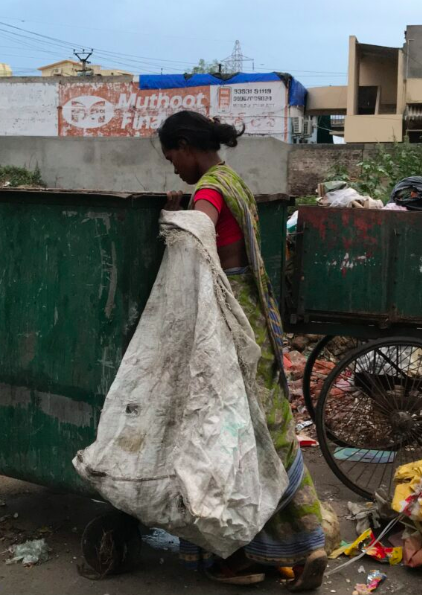 Suvartha added that there was a huge demand for ‘human hair’ – she often collects loose clumps of hair, untangles and cleans them, before selling it to the scrap dealers. A kilo of hair fetches Rs400 – 500 (5 – 7 USD). However, it takes her many days to accumulate a kilo of hair.
Suvartha added that there was a huge demand for ‘human hair’ – she often collects loose clumps of hair, untangles and cleans them, before selling it to the scrap dealers. A kilo of hair fetches Rs400 – 500 (5 – 7 USD). However, it takes her many days to accumulate a kilo of hair.
I thought about how the constant bending and carrying heavy loads must have a detrimental impact on Suvartha’s health.
She admitted that she was unable to work every day because she is physically exhausted – and often suffers from body soreness, joint and muscle pains for days at a stretch.
At one point a large pack of dogs started barking at us. Suvartha saw that I was alarmed by this and she said:
“Don’t worry, they’re not barking at you. They’re barking at me – after all, we are after the same thing.”
I couldn’t help but wonder at how depraved our society was to let people live in such inhuman conditions. Suvartha talked about how often she gets bitten by dogs and how she’s now used to it’. She visits the doctor depending upon her schedule and convenience. While I was shocked to hear this, I also realised that each day poses new challenges to Suvartha and she cannot always schedule healthcare seeking activities.
After a few hours of waste picking, Suvartha decided to take a break. I asked her how she learnt to work at such a brisk pace. She said that when she gave birth to her children, she couldn’t just sit at home and had to provide for her family. She would carry her children along wherever she went. She would park her cart close to an empty piece of land, make a hammock out of a saree, tie it to a tree, and place her kids in it. She would feed them and then go out for a quick round of waste picking. She would repeat this time and again, until it was finally time to go home.
Walking the road together
While Suvartha’s work can be difficult it is also an opportunity to catch up with friends.
There are moments of camaraderie and chat woven throughout her work.
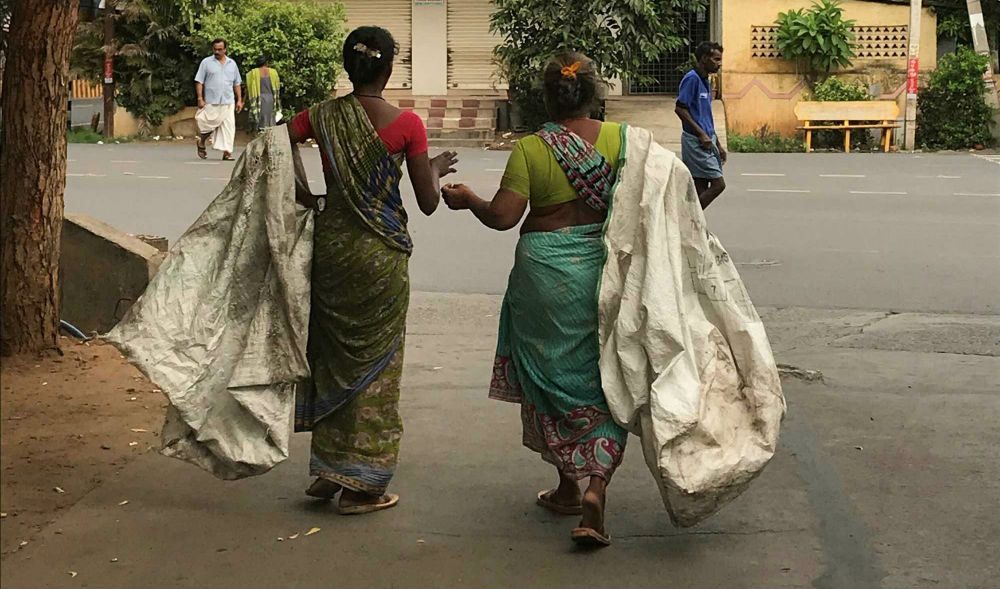
A friend of Suvartha’s dropped by to have a chat. They had a light-hearted discussion and shared a few hearty laughs. Although Suvartha’s work is incredibly difficult, it is not devoid of moments of camaraderie with her friends and colleagues.
I asked about how she could leave her cart lying around while she went waste picking and whether she was worried about someone taking away her recyclables. Suvartha smiled and said that in the many years of working as a waste picker, she had never experienced something like. There is a lot of trust among waste pickers and it is very rare for someone to violate that trust.
We didn’t eat ‘tiffin’ (light breakfast consisting of typical tea – time foods like idlis/dosas), because Suvartha wanted to collect as many recyclables and earn as much money as she could. She didn’t want to waste her time eating or resting.
 Kabadi shops are operated by junk or scrap dealers. Most scrap dealers (especially men) start their working lives as waste pickers, like Suvartha. In many cases, they occupy ‘higher’ positions in the waste to recovery value chain – often leaving the more physically arduous tasks to women.
Kabadi shops are operated by junk or scrap dealers. Most scrap dealers (especially men) start their working lives as waste pickers, like Suvartha. In many cases, they occupy ‘higher’ positions in the waste to recovery value chain – often leaving the more physically arduous tasks to women.
Suvartha usually sells her collection of recyclables to these scrap dealers – where she is paid for the weight of the recyclables that she has collected.
The scrap dealers then segregate different types of recyclables and sell it to other actors further along the waste to recovery value chain depending upon the types of waste collected – plastic, glass, paper etc.
 Suvartha got to the kabadi shop at 16.30 and I was shocked to see the size of the gunny bag. Suvartha had managed to collect recyclables weighing a whopping 73 kilos and was paid Rs 1300 (18 USD). I could not get over how a frail person like her could cycle around the city with such a heavy load.
Suvartha got to the kabadi shop at 16.30 and I was shocked to see the size of the gunny bag. Suvartha had managed to collect recyclables weighing a whopping 73 kilos and was paid Rs 1300 (18 USD). I could not get over how a frail person like her could cycle around the city with such a heavy load.
Happiness and contentment showed on Suvartha’s face.
Shortly after collecting her earnings for the day, Suvartha asked me and if I’d like to eat ‘pani puri’ (Indian snack) as she wanted to give a treat. I was struck by how someone who has such limited financial resources could part with so much – I was humbled by her kindness and warmth. I don’t think words can ever do justice to how Suvartha made me feel right in that moment. I bought a couple of sodas for us and we enjoyed our drinks over a candid conversation.
It is rare to earn so much in a day because of the uncertainty around the composition of recyclables that Suvartha collects. This made me reflect about how dependent waste pickers are on how and where the waste is thrown – every day is new and unknown
In Suvartha’s opinion, the men who pick waste don’t work as hard as the women – and don’t earn as much either. She said that most of them spend their earnings on alcohol and drugs, leaving no money for the rest of the household. Her husband doesn’t contribute much money towards the family, preferring to buy alcohol – which has been a trigger for domestic abuse on multiple occasions. Suvartha lamented how she’s practically the only person earning money in her family and she has three children to look after. Often when money is tight at home, she goes begging in order to supplement her income.
She also spoke about her life in the slums and how things don’t seem to change irrespective of which political party is in power. She lamented the sheer inconvenience that Aadhaar cards (biometric resident identification) had brought. They are denied access to health and education because they do not have the cards. She added that registering at Aadhar centres costs her day in unearned wages. It made me wonder how proof of identity could be so powerful and instrumental in denying people access to their basic and fundamental rights as citizens.
During her rounds, Suvartha excitedly pointed towards this motorcycle rickshaw. She spoke about how useful a rickshaw like this would be and how it would make her work a lot simpler. Although it is expensive she hoped that with hard work, she would be able to purchase it in the future.
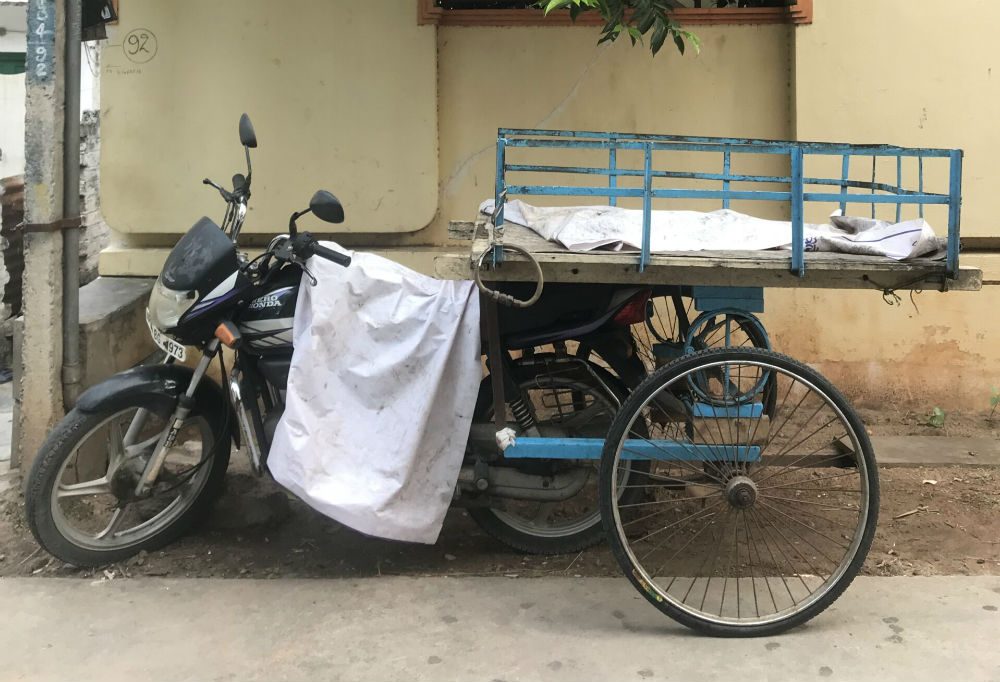
Acknowledgements
The intention of this exercise was to get to know the people and communities that we will be working with through the course of ARISE. It was meant to be an immersive and reflective exercise – trying to walk someone else’s path. I would like to express my deepest gratitude to Suvartha for not only allowing me to shadow her but also sharing her life and stories with me. I am also thankful to the other waste pickers for opening up their lives to me and enabling me to think differently.
Suvartha is not her real name but was used to protect her identity. Suvartha chose her pseudonym, in Telugu it means ‘good news’ (with specific reference to the Bible). This shadowing would not have been possible without the unwavering support of the Dalit Bahujan Resource Centre (DBRC), especially Anil and Jhansi. They were instrumental in not only organising the logistics of the shadowing, but also ensuring that I was safe and comfortable throughout.
I would also like to extend my sincerest thanks and appreciation to the ARISE TGI Advisory Group Members for their intellectual guidance and insightful feedback on early versions of this photo essay. I thank them for asking incisive questions and broadening my thinking through the process.
My journey in ARISE would not have been possible without my amazing and inspiring team – Surekha Garimella, Prasanna Saligram and JK Lakshmi. I am indebted to them for their constant encouragement, support and generosity. They have been instrumental in pushing me out of my comfort zone and challenging me to ask the right questions! Finally, I am most thankful to Kate Hawkins for her enthusiastic support and guidance. I am immensely appreciative of her for the patience and keen interest she has shown in developing and fine-tuning this photo essay.
This photo essay is written by Shrutika Murthy, Research Assistant, The George Institute for Global Health India based on the research project 'Accountability for Informal Urban Equity (ARISE)'. The blog was first published on the ARISE Consortium website and is republished here with permissions.


